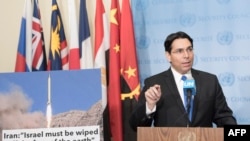Israel protested Monday at the U.N.'s decision to ban panels on Jerusalem and Arab Israelis from an exhibition at the United Nations on various aspects of the country and the heritage of the Jewish people.
Israel's U.N. Ambassador Danny Danon initially complained that three panels with photos and text had been barred from the exhibition which opened Monday on a first floor corridor at U.N. headquarters. But Danon said the U.N. decided at the last minute to allow a panel on Zionism to be included, which he welcomed as "a step in the right direction.''
The ambassador demanded that the U.N. allow the panels on Jerusalem and Arab Israelis to be shown as well.
The exhibition is sponsored by the Israeli ambassador and the non-profit organization StandWithUs dedicated to informing the public about Israel.
It includes panels on Israeli Innovation, Green Technology, Humanitarian Aid, Jewish Refugees from Arab Countries, Tel Aviv and The People of Israel. The Zionism panel calls Zionism "the liberation movement of the Jewish people who sought to overcome 1,900 years of oppression and regain self-determination in their indigenous homeland.''
U.N. spokesman Stephane Dujarric said "the panel on Zionism was not disallowed.''
He said "there was a misunderstanding because there was a question about a photo in that panel, and so it was initially communicated to the [Israeli] Mission that the panel could not be displayed,'' but that was immediately revised and the mission was told it could be displayed.
The panel on Jerusalem calls the city "The Spiritual and Physical Capital of The Jewish People.''
It says "Jerusalem has been the center and focus of Jewish life and religion for more than three millennia and is holy to Christians and Muslims as well.''
The U.N. General Assembly in October 2012 recognized a state of Palestine in the West Bank, Gaza and east Jerusalem, lands Israel captured in 1967. The Palestinians want east Jerusalem as their capital but peace negotiations with Israel failed two years ago and have not been revived.
The panel on Israeli Arabs says they are "equal citizens under the law in Israel, the only proven democracy in the Middle East.'' It says "they live, study and work side by side with Jews in communities all over the country'' and "serve in the Israeli Parliament, vote in all elections, and enrich Israel's diverse culture.''
Israeli Arabs make up about 20 percent of Israel's population of more than 8 million people. Several Israeli lawmakers have questioned the loyalty of Israeli Arabs and a recent Pew Research Center poll found that nearly half of Israeli Jews agreed with vague wording that Arabs could be expelled or transferred from the country.
Dujarric, the U.N. spokesman, didn't directly address the issues with the panels on Jerusalem and the Israeli Arabs but said existing regulations require displays "to be in conformity with the purposes and principles'' of the United Nations.
"We are the custodians of this space and so it falls to us to make the call of whether proposed exhibits are in such conformity,'' he said. "The relevant departments try to the best of their ability to keep these spaces free from polemics.''
Israel Protests UN Ban on Exhibition

UNITED NATIONS —



